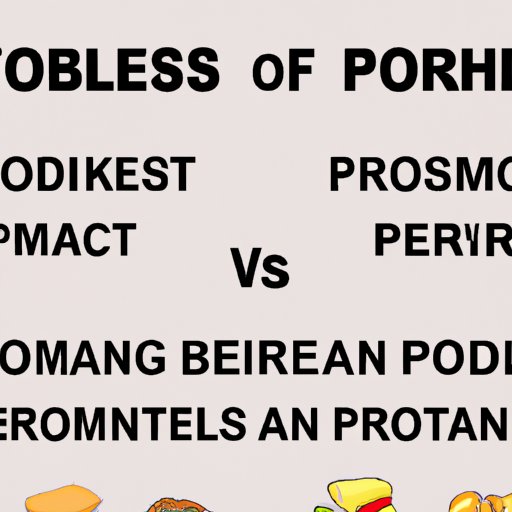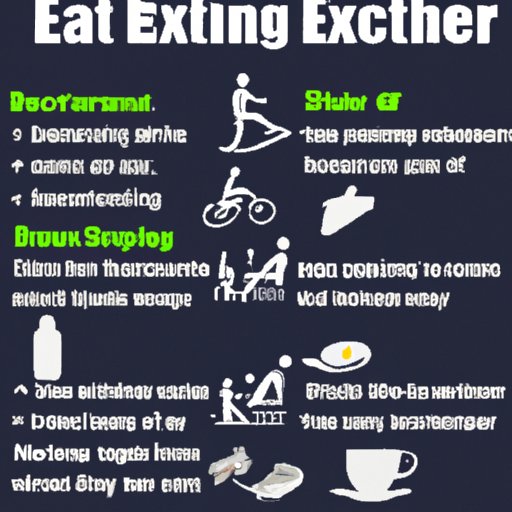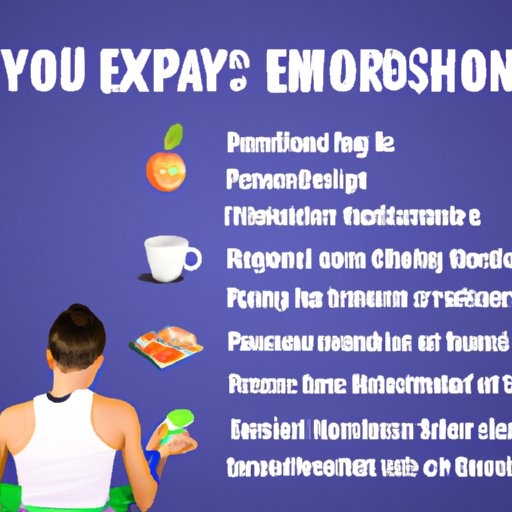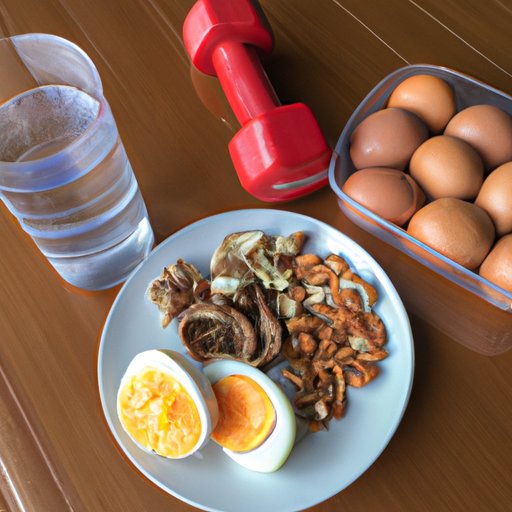Introduction
One of the most common questions when it comes to exercise is whether you should eat before or after working out. This is an important question to consider, as the right nutrition can help you maximize your workout and reach your goals faster. In this article, we will explore the benefits of eating before and after exercise, as well as the potential drawbacks and the science behind it. Read on to learn more about pre and post-workout nutrition.

Pros and Cons of Eating Before or After Exercise
Before we dive into the details of eating before or after exercise, let’s take a look at the pros and cons. Eating before exercise can provide the energy you need to power through your workout, while eating after helps your body recover and rebuild muscle. However, there are potential drawbacks to both, such as feeling bloated or gaining weight.
Benefits of Eating Before Exercise
Eating before exercise can provide the energy needed to power through your workout. According to Registered Dietitian Nutritionist Amy Gorin, “If you’re going to be exercising for longer than an hour, you’ll want to fuel up with a snack that contains both carbohydrates and protein.” Eating a balanced meal before exercise can also keep blood sugar levels stable and prevent fatigue.
Benefits of Eating After Exercise
On the other hand, eating after exercise can help your body recover and rebuild muscle. According to sports dietitian Melissa Rifkin, “The goal of post-workout nutrition is to replenish glycogen stores, repair and build muscle tissue, and rehydrate the body.” Eating after exercise can also reduce muscle soreness and help you refuel for the next workout.
Potential Drawbacks of Eating Before or After Exercise
While there are clear benefits to eating before or after exercise, there are also potential drawbacks. Eating too much before exercise may result in feeling bloated or sluggish during your workout. On the other hand, eating after exercise may cause weight gain if you don’t burn off the extra calories. It’s important to find the right balance between eating enough to fuel your body and eating too much.
Exploring the Benefits of Eating Before or After Exercise
Now that we’ve explored the pros and cons of eating before or after exercise, let’s take a look at what to eat before and after exercise. Eating the right foods can help you maximize your workout and reach your goals faster.
What to Eat Before Exercise
When it comes to pre-workout nutrition, the goal is to give your body the fuel it needs to perform at its best. Registered Dietitian Nutritionist Sharon Zarabi recommends eating a small meal or snack that contains both carbohydrates and protein. Some good options include oatmeal with nuts, yogurt with fruit, or a peanut butter and banana sandwich.
What to Eat After Exercise
Post-workout nutrition is all about replenishing your body’s energy stores, repairing and building muscle, and rehydrating. According to Zarabi, the ideal post-workout snack should contain carbs and protein in a 4:1 ratio. Good options include a smoothie with banana and nut butter, Greek yogurt with berries, or a turkey and cheese wrap.
Calories Needed for Optimal Performance
It’s also important to consider how many calories you need for optimal performance. According to Rifkin, “Most athletes need 1.2 to 2 grams of carbohydrate per kilogram of body weight per day, depending on the intensity and duration of their workouts.” For example, a 150-pound athlete would need approximately 180 to 300 grams of carbs per day.

The Science Behind Eating Before or After Exercise
Now that we’ve explored the benefits of eating before and after exercise, let’s take a look at the science behind it. Understanding how nutrition affects performance can help you make the right choices for your body.
How Nutrition Affects Performance
Nutrition plays an important role in athletic performance. According to research published in the Journal of Sports Sciences, “Nutrition is essential for the maintenance of health and physical activity and is a key factor in optimizing training, competition and recovery.” Eating the right foods can help you maximize your performance and reach your goals faster.
The Role of Glycogen Stores
Glycogen is the main source of energy for athletes during exercise. According to a study published in the journal Nutrients, “Glycogen is an essential fuel for athletes and depletion of glycogen stores is associated with impaired performance.” Therefore, it’s important to replenish glycogen stores after exercise to ensure optimal performance.
Understanding Metabolism
Metabolism is another important factor to consider when it comes to exercise and nutrition. According to the American Council on Exercise, metabolism is “the process by which your body converts the food you eat into energy.” Eating the right foods can help boost metabolism and increase energy levels.

What Athletes Need to Know About Eating Before or After Exercise
Now that we’ve explored the science behind eating before or after exercise, let’s take a look at what athletes need to know. Knowing how to properly fuel up and recover can help you maximize your workout and achieve your goals faster.
Fueling Up for Sports Performance
According to Rifkin, “Proper fueling before and after exercise is essential for optimal sports performance.” Eating the right foods before and after exercise can help you maximize your performance and reach your goals faster.
Avoiding Fatigue During Exercise
Eating the right foods before exercise can also help you avoid fatigue during your workout. According to a study published in the journal Nutrients, “Adequate nutrition before exercise can help to maintain adequate energy levels and reduce fatigue during exercise.”
Recovering Quickly After Exercise
Eating the right foods after exercise can also help you recover quickly. According to a study published in the journal Sports Medicine, “Ingesting carbohydrates and protein shortly after exercise can enhance recovery and improve performance in subsequent exercise sessions.”
How Eating Before or After Exercise Can Help You Reach Your Goals
Now that we’ve explored what athletes need to know about eating before or after exercise, let’s take a look at how it can help you reach your goals. Finding the right balance of nutrients can help you maximize your workout and achieve your goals faster.
Maximizing Your Workout
Eating the right foods before and after exercise can help you maximize your workout. According to Zarabi, “Eating before and after your workouts can help you get the most out of your exercise routine.” Eating the right foods can help you perform better and reach your goals faster.
Achieving the Right Balance of Nutrients
It’s also important to consider the balance of nutrients you need for optimal performance. According to Rifkin, “The key is to find the right balance of carbohydrates, proteins and fats that works for you.” Eating the right balance of nutrients can help you maximize your performance and reach your goals faster.
Creating a Healthy Eating Plan
Finally, creating a healthy eating plan can help you reach your goals. According to Zarabi, “Developing a healthy eating plan that includes pre and post-workout snacks can help you stay on track and reach your fitness goals.” A healthy eating plan can help you stay motivated and achieve your goals faster.
Learn When Eating Before or After Exercise is Right for You
Now that we’ve explored the benefits of eating before or after exercise, let’s take a look at how to determine when it’s right for you. Adjusting based on activity level and considering different types of exercise can help you make the right choices for your body.
Adjusting Based on Activity Level
It’s important to adjust your pre and post-workout nutrition based on your activity level. According to Zarabi, “If you’re doing an intense workout, you may need to eat more before and after to fuel your body.” On the other hand, if you’re doing a light workout, you may not need as much fuel.
Considering Different Types of Exercise
It’s also important to consider the type of exercise you’re doing. According to Rifkin, “Different types of exercise require different amounts of fuel.” For example, endurance athletes may need more carbs before and after exercise, while strength athletes may need more protein.
Monitoring Your Progress
Finally, it’s important to monitor your progress and make adjustments as needed. According to Zarabi, “Be sure to listen to your body and adjust your nutrition plan as needed.” Tracking your progress can help you make the right choices for your body.
Conclusion
In conclusion, eating before or after exercise can have a significant impact on your performance. Eating the right foods can help you maximize your workout and reach your goals faster. However, there are potential drawbacks to both, so it’s important to find the right balance between eating enough to fuel your body and eating too much. By adjusting based on activity level and considering different types of exercise, you can make the right choices for your body.
Summary of Pros and Cons
Eating before exercise can provide the energy you need to power through your workout, while eating after helps your body recover and rebuild muscle. However, there are potential drawbacks to both, such as feeling bloated or gaining weight.
Key Takeaways
In summary, eating before or after exercise can have a significant impact on your performance. Eating the right foods can help you maximize your workout and reach your goals faster. However, it’s important to find the right balance between eating enough to fuel your body and eating too much. By adjusting based on activity level and considering different types of exercise, you can make the right choices for your body.
(Note: Is this article not meeting your expectations? Do you have knowledge or insights to share? Unlock new opportunities and expand your reach by joining our authors team. Click Registration to join us and share your expertise with our readers.)
